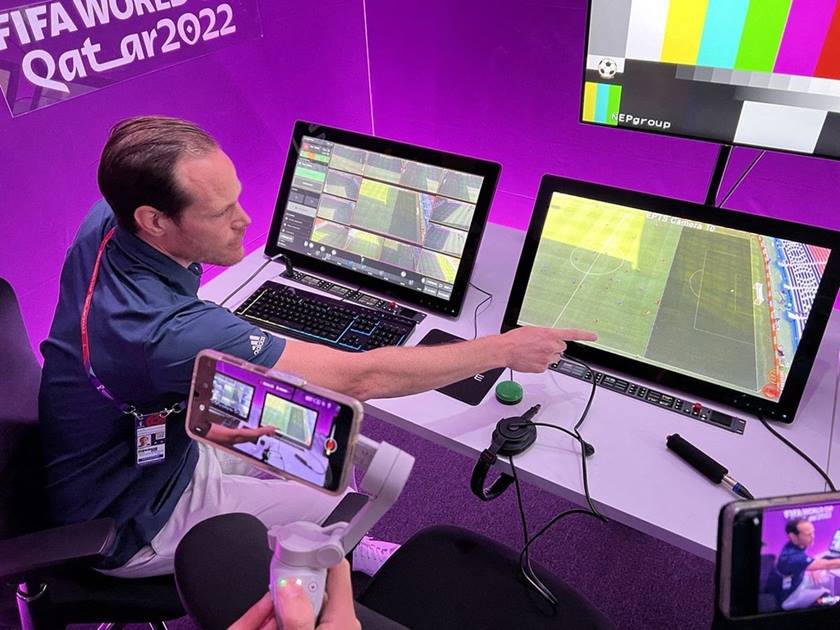ID :
649693
Mon, 12/05/2022 - 18:37
Auther :
Shortlink :
https://www.oananews.org//node/649693
The shortlink copeid
Qatar 2022/ Referee Experts Highlight to QNA Role of Semi-Automated Offside Technology to Help Referees

Doha, December 05 (QNA) - The semi-automated offside technology introduced in the FIFA World Cup Qatar 2022 helped referees to take accurate decisions and overcome controversy.
Thanks to this technology in the group stage, three goals were chalked off as offsides in the first half of Argentine-Saudi Arabia encounter, and a Cristiano Ronaldo's goal scored in his country's match against Ghana.
This newly introduced system uses 12 cameras placed around the stadium that track the ball movement as well as 29 data points on each individual player. Also, the World Cup ball is equipped with a sensor that sends 500 signals per second to the cameras.
In the same context, the World Cup saw doubled stoppage times, with some matches lasting more than 100 minutes. The Group A opener between the Netherlands and Senegal saw 12 minutes added as stoppage time, while 14 minutes were added in Wales-America showdown in Group B.
The Chairman of the FIFA Referees Committee, Pierre Luigi Collina stressed at a press conference before the kick-off of the World Cup that the new regulations and mechanisms for referees are to combat wasting time in matches.
Collina said that he was closely monitoring the instructions he made through a group of referee observers and evaluators, to address these phenomena.
In this regard, some retired referees hailed in statements to Qatar News Agency (QNA) the performance of referees in this World Cup edition, stressing at the same time that the upcoming matches will be decisive to evaluate referees.
They noted that offside cases in the World Cup do not have errors because they depend on artificial intelligence and do not involve any human intervention.
During their statements to QNA, many referees praised the performance of English referee Michael Oliver, who officiated the Japan-Costa Rica match, and Saudi Arabia-Mexico game, along with English referee Anthony Taylor and U.S. Ismail Al Fateh, and wished success to Qatari referee Abdul Rahman Al Jassem in the rest of the World Cup rounds.
For his part, Abdullah Al-Qahtani, the former international referee and evaluator in Alkass channels, said that the level of referees in the World Cup is good with the tournament reaching the final rounds, indicating that errors have become few in light of the presence of the used techniques, whether the video assistant referee or the semi-automatic offside technique.
Al-Qahtani added, in an exclusive statement to (QNA), "Without a doubt, the introduction of technology achieved justice," pointing to the distinction of many referees in the World Cup, including the Spanish referee Antonio Mateu Lahoz, who managed the matches with high efficiency.
He said, "Certainly the elimination rounds in the tournament will be important in the referees' career, and there is great anticipation, given that sensitive matches have not started yet, and some errors may appear, and (VAR) may be the savior."
In this regard, Tamam Hamdoun, referee evaluator and lecturer said that the differences are clear in terms of levels between referees in Europe and South America on the one hand, and referees in the continents of Asia and Africa on the other hand.
The technology used in the World Cup in Qatar is exceptional, and this will help give quick and correct decisions, and prevent the disruption of matches, he said.
Also speaking to (QNA), retired Syrian international referee, Hamdi Al Qadri, who participated in the FIFA World Cup Germany 2006, said that the level of referees in general at the end of the group stage was acceptable, indicating that most of the matches did not witness controversial cases.
Al Qadri, who officiated many matches in the FIFA Club World Cup, added that some matches saw important refereeing errors, despite the presence of all elements and means of assistance and technical support. (QNA)





